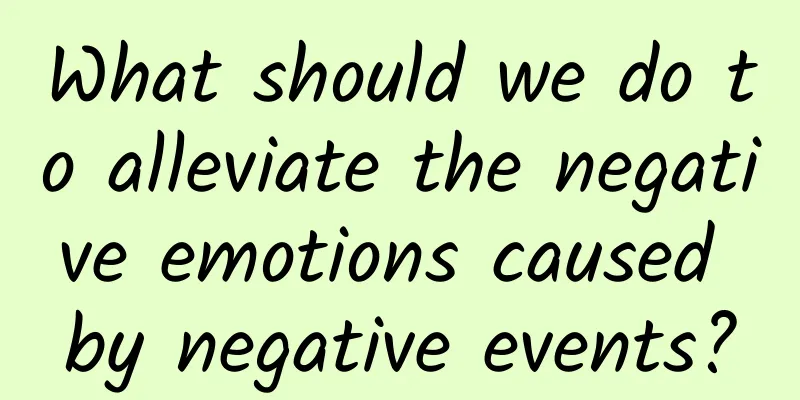What should we do to alleviate the negative emotions caused by negative events?

|
Produced by: Science Popularization China Produced by: Qi Shuting (Institute of Psychology, Chinese Academy of Sciences) Producer: Computer Network Information Center, Chinese Academy of Sciences In life, whether we see it in the news or experience it ourselves, we will inevitably experience psychological fluctuations of varying degrees because of some negative events. As a result, we may have negative emotions such as anger, disappointment, sadness, and a sense of meaninglessness, and we may also have negative behaviors such as negativity, world-weariness, giving up, and revenge. Image source: Veer Gallery Compared with negative events happening around us, negative events that are farther away from us, such as global warming and accelerated glacier melting, have relatively little psychological impact on us. It’s all bad news, so why do we get affected differently? React differently? Cope differently? This requires us to pull the perspective back to the psychological distance between the event itself and us—— The closer the event is to us psychologically, the greater the risk and uncertainty we perceive, the more one-sided and partial we look at the problem, and the more susceptible we are to the influence of negative emotions. What is psychological distance? The so-called psychological distance refers to the distance between us and an object or event as we perceive it with ourselves as the reference point. It includes four dimensions: time distance, space distance, social distance and authenticity. Specifically: From the perspective of time, events that occurred in the past or future (such as the end of next year or the New Year of last year) are distant things, while things that happen at this moment are close. From the perspective of spatial distance, events in distant places (such as foreign countries and Mars) are long-distance things, while things happening here are close. From the perspective of social distance, other people or unrelated people (such as strangers) are distant things, while things happening to oneself or one's relatives and friends are close. From a reality perspective, events with a very low probability of occurrence (such as winning the lottery) are distant things, while events with a very high probability of occurrence, such as having lunch today, are near events. The Construal Level Theory (CLT) in psychology holds that, on the one hand, the closer we are psychologically to an event, the higher the perceived risk and uncertainty. For example, if you are a smoker and your relatives or friends who are also smokers die of lung cancer, you will perceive the risk of smoking as higher and be more likely to quit smoking than if you saw a news report about a smoker dying of lung cancer. In other words, the more negative events are related to our perception, the more we feel that we are likely to encounter similar negative events, the more we will be affected by them, and thus produce some related reactions. Image source: Veer Gallery On the other hand, the closer we are psychologically to an event, the more we will pay attention to specific information, look at problems more one-sidedly and partially, be more likely to see some flaws, and often fail to see the overall picture, so we overly worry about individual details. For example, when looking at their children's academic performance, parents often get caught up in the fact that "they only got 99 points in the math test and they actually got one multiple-choice question wrong," and ignore the overall message that the child has actually basically mastered the learning content. For example, when a department leader looks at the code written by his subordinate, he may always feel that it is not neat enough and feel angry, but he may ignore the fact that this string of code is enough to solve the problem raised by the customer and is very efficient. Why do we become emotionally contagious? In addition to the impact on perception and attitude, when the protagonist in the news is closer to us, we will also be affected by the emotions conveyed by the protagonist in the news, which is called emotional contagion theory (ECT). Emotional contagion is the process by which we perceive the emotional changes of people around us by capturing the emotions of others. When we feel the emotional expression of people around us, we will respond subconsciously and have the same emotional experience as the other person. In other words, if the person who infects us has positive emotions, we will also feel positive emotions, thus responding positive emotions. For example, we will involuntarily feel happy in an amusement park; after watching a comedy movie or attending a party, we will feel happy. Amusement park (Photo source: Veer Gallery) But on the other hand, if the person who infects us holds very negative emotions, such as anxiety, depression, anger, sadness, we will also feel them and reflect them back. For example, if the leader is in a bad mood today and speaks harshly during the meeting, then I may also be in a bad mood and show some negative emotions to my child when I get home. And my child may be in a bad mood and kick the kitten at home. This is the kicking cat effect. This explains why we feel depressed, melancholy and uncomfortable after reading news or in-depth reports about people jumping off buildings or committing suicide due to hopelessness in life. Image source: Veer Gallery This kind of emotional contagion is more easily spread between individuals within a group. This can also explain why we are more sensitive to certain emotions within our own group. High similarity will produce stronger empathy and emotional contagion. Therefore, college students will react particularly strongly to suicide incidents in colleges and universities. Those whose attention is easily attracted by others are more susceptible to emotional contagion. Of course, this is also related to age and personality traits. People with strong independence and emotional stability are less susceptible to the influence of others. At the same time, studies have shown that women are more susceptible to emotional infection than men because they are more sensitive to the emotional expressions of others and are better at expressing and responding to emotions. Image source: Veer Gallery How do we cope with the impact of negative events? As a denominator in society, in this era of information explosion, we will inevitably receive overwhelming news and hot events every day. Since it is unavoidable, what should we do when facing negative events in life or even around us? Here are a few of our suggestions: Improve your tolerance for uncertainty. Accept the uncertainty and risks in life and try to improve your ability to resist risks. For example, build a strong body, save money appropriately, constantly improve your work ability and ability to control your life, and don't be afraid of negative events. At the same time, you must also accept that you are powerless to do something. Image source: Veer Gallery Try to avoid getting too caught up in the details of an event. Look at the problem from a holistic, global perspective, and don't get stuck in a rut. Try to look at other people's emotions rationally and analyze problems objectively and calmly. Don't be easily led by others, don't be easily indignant, and don't express your opinions before you know the truth. Stay calm when things happen, don't be a "keyboard warrior", don't be a "troll", and don't let others use you to influence the direction of public opinion. You can try to look at the problem from a distance. Don't dwell on your friend here and now, but think about what he would do from afar. For example, your best friend is having trouble at work and wants to quit, and hopes to seek your help. At this time, treating him as a stranger may help you to more rationally sort out the problems he encounters in the workplace, and thus give better and more objective advice. Image source: Veer Gallery Sublimate the threat brought by negative events into actions to improve the negative status quo. Take this as a warning, prevention first, and control second. For example, in the face of the frequent suicides and sudden deaths of college students, on the one hand, we need to call on the society to pay attention to and care about the mental health of students; on the other hand, you can pay more attention to your friends who are still studying, pay more attention to their mental conditions, and provide timely help when they encounter problems. References: 1. Wang Xiao, Li Wenzhong, & Du Jiangang. (2010). A review of research on emotional contagion theory. Advances in Psychological Science, 18(8), 1236–1245. 2. Huang Jun, Li Ye, & Zhang Hongwei. (2015). Application and development of construal level theory. Advances in Psychological Science, 23(1), 110-119. 3. Kim, K., & Kim, H.-S. (2018). Time matters: Framing antismoking messages using current smokers' preexisting perceptions of temporal distance to smoking-related health risks. Health Communication, 33(3), 338-348. 4. Li, JJ, Chen, X.-P., Kotha, S., & Fisher, G. (2017). Catching fire and spreading it: A glimpse Into displayed entrepreneurial passion in crowdfunding campaigns. Journal of Applied Psychology, 102(7), 1075-1090. 5. Trope, Y., & Liberman, N. (2010). Construal-level theory of psychological distance. psychological Review, 117(2), 440-463. 6. Wiesenfeld, BM, Reyt, J.-N., Brockner, J., & Trope, Y. (2017). Construal level theory in organizational research. Annual Review of Organizational Psychology and Organizational Behavior, 4, 367-400. |
>>: In which season are grasshoppers born? What are the distinctive features of grasshoppers?
Recommend
Trimetazidine can cause harm without anyone noticing. Are stimulants a blessing or a curse?
This is the 3796th article of Da Yi Xiao Hu The B...
"Dry goods" for pregnant mothers: Help you relieve several common pains during pregnancy
As the pregnancy progresses, pregnant women's...
Woman with back pain and weak legs
In daily life, many women are prone to back pain,...
What to do if the vulva is itchy and has a burning sensation
Gynecological problems are probably what women ar...
How to choose the whole house customized board? What should I pay attention to when customizing the whole house?
Whole house customization is a very popular decor...
What are the effects of insomnia and how to solve it?
What are the effects of insomnia and how to solve...
Improve neck and shoulder pain
When exercising for neck and shoulder pain and pe...
Can girls eat grapes during their period?
Grapes are sweet, juicy and nutritious. Many peop...
Breakthrough in sleep medicine: The brain consolidates positive emotions in dreams
Processing emotions, especially distinguishing da...
Medical artificial intelligence: new technology brings a new era
In today's technological torrent, artificial ...
What should I drink to treat uterine cold?
In daily life, the health of the uterus is very i...
What should I do if I have a right follicular cyst?
Ovarian cysts are a common ovarian disease in wom...
What causes nipple pain during ovulation?
If a woman experiences nipple pain, it will cause...
Will I get pregnant if I have sex during delayed menstruation?
The greatest harm caused by having sex during men...
Anti-endometrial antibodies negative?
Generally, women need to do a lot of tests when p...









